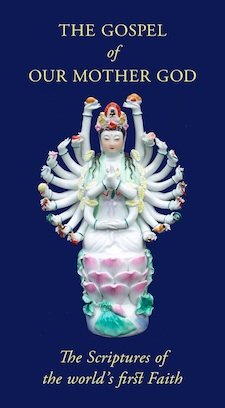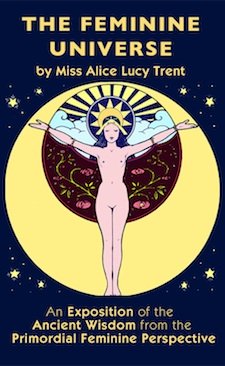The Authority of Feminine Scripture
Is Feminine Scripture truly authoritative? How can we be sure of its authority?
We recently received the following "devil's advocate" communication on this point.
Honoured Ladies of the Chapel of Our Mother God,
I have been a Filiana for years but recently I have been troubled by questions about our Scriptures and the Deanic Faith in general.
I hope that you will be able to help me find the answers as I play devil's advocate:
How can texts offer us safe guidance in life if we do not believe them to be true because of their source, of which we know next to nothing, but for other reasons, of which I know only three:
1. The scriptures can be seen to change lives in a good way (our own and others).
2. The scriptures are in accordance with things already believed prior to the acceptance of the scriptures because of philosophical considerations / historical evidence / personal inclination (in a way this encompasses 1. because to say they "make us better" means to have a concept of good not derived from the religious teachings but held before one encountered them).
3. The believer herself has at least one spiritual experience in which God reveals to her (and her alone) that She wishes her to follow a Deanic path / take the Filianic Scriptures as guidance in her religious life.
The Scriptures themselves say: "Within the world you may be certain only of that Truth which my Mother has given from beyond the world."
But is that not a contradiction in a scriptures that does not claim to be a revelation by God but says it may be considered "inspired poetry"?
Since true knowledge of anything must necessarily come from a source outside of ourselves, must be given to us by God (or is this basic assumption false in some way?), can a Religion be true if it is not founded on such an "occasion" of God revealing God even if such a revelation must necessarily take place within history and the changing world?
Of the three options I list above (and perhaps I have just not yet seen the real reason and that is the crux of the matter) only the third seems valid to me, and yet it leaves me wondering how a religious community can be possible under those circumstances.
I look forward to your reply very much,
a blind Sister-Traveler
Thank you for your thoughtful questions. As always, we appreciate "devil's advocate" questions because it is important to consider every aspect of our Faith without flinching from difficulties.
I think the problem here is that the question is posed in very much a Western and Christian-oriented language. The idea that there is a "Book" that is uniquely inspired is not one that exists in quite the same manner outside the Abrahamic sphere.
Within that sphere it is a rather curious notion. The Christian Bible, for example, is not really a single book but a diverse collection of writings made by different people at different times (about many of whom we know very little with any certainty) and declared by a number of Church councils (not all of which agreed with each other) to be canonical.
Somehow from this process has come a situation in which a large number of believers seem to think that "the Bible" is a single document that came down from Heaven on a cloud.
The Koran is in a somewhat better position, provided one accepts that the Prophet Muhammed (who spent a very great deal of his time forcibly destroying other people's places of worship) was uniquely inspired to deliver the word of God.
Both Islam and (at least Protestant) Christianity see "the Book" as the source of religion. The latter, at least recently, tends to see it as containing unique events that are "true" on the same level as material history.
This is not quite the way we regard either Scripture or religion. For example, our Scriptures have an account of the Creation in which the world is formed from Dea's laughter. We do not regard it as the only possible account. There are other stories, for example, in which Our Mother hatches the manifest universe from the World Egg. On a purely "story" level this would seem to be a contradiction, but to talk in terms of "contradiction" in mythos as if we were dealing with material events is, frankly, rather childish. Clearly the creation of the world (that is, the manifest universe of space, time and matter) did not take place inside the world of space, time and matter, so no story describing its creation can be in any sense "literal".
Each people has an approach to Truth via various traditions: Hindu, Buddhist, Taoist, Jewish, tribal traditions and so forth. God does not leave Herself without a witness, even if, in most cases, the traditions have become heavily patriarchalized.
The idea of a world that languishes without Truth, waiting for a Single Inspired Book, a world full of false idols that need to be smashed to make way for the One Truth, is really a very misleading vision, and one that seems unique to the Abrahamic world, particularly of Christianity and Islam.
A traveler in Tibet is not met with the thought "Here is a heathen who needs to be converted", but with the courteous and utterly sincere question "To what noble tradition do you belong?" It is assumed that each people has its own proper approach(es) to the Truth.
The fact that the traveler may be a true heathen – a person without religion or tradition – is a relatively recent phenomenon, and one that has come wholly out of the post-Christian West. Indeed, disrespect for other traditions of Truth (however fanatical the faith that drives them) ultimately carries within it the seeds of disrespect for one's own tradition. Atheism is a Christian heresy.
We do not regard ourselves as having a monopoly of Truth, nor do we regard our Scriptures as the One Inspired Text. We are not nonplussed by the notion that they are merely "devotional poems" (though many have found them to have far greater depth and power than such a designation would appear to imply) because we do not rely on them as the One Source of Truth in an otherwise benighted world full of false idols.
The only idols that are wholly false are those of post-Christian materialism. Even such strange faiths as Mormonism, we feel sure, contain enough seeds of Truth to bring their adherents closer to God.
We believe that we are more solidly grounded in traditional Truth than such faiths.
You say, very reasonably:
The Scriptures themselves say: "Within the world you may be certain only of that Truth which my Mother has given from beyond the world."
But is that not a contradiction in a scriptures that does not claim to be a revelation by God but says it may be considered "inspired poetry"?
The answer to that is: Yes, if you are looking at the question from the exclusivist point of view of Christianity, Islam or Scientism (the mongrel child of Christianity), or if you are taking the Bibliocentric standpoint of Christianity or Islam.
We believe that there is a fundamental Truth and that it is not the exclusive possession of the Filyani or of any other faith or tradition. This is "that Truth which my Mother has given from beyond the world" and has given generously to all Her children.
Do we believe that our way is closer to the original Faith before it was distorted by patriarchy? Yes – but that is not the most important point. We are not trying to convert others to our path. We do not believe we are the Only Way.
Does the idea that our Scriptures are "only" inspired poems harm our faith? Why should it? We are not a "Religion of the Book" to use the Islamic phrase. We do not regard the Book as the source of our faith.
Is the Book, then, important? Yes, it certainly is. There is an astonishing depth of wisdom in the Gospel of Our Mother God to which many of us can attest. It is a different world from shallow post-Christian or pseudo-Eastern New Age writings and breathes the spirit of true Eternal Tradition. This is something each person must discover for herself.
Again, we are not here to force acceptance of our Scriptures. We humbly offer them for what they are and if people find them of value, as so many people already have, we are happy.
See also:
Send us your questions or comments
Chapel of Our Mother God Homepage
All written material at the Chapel of Our Mother God is copyright. Should you wish to reproduce any portion please contact us for permission.
Facebook or Twitter
This section:
Fundamental Beliefs
A complete guide to the faith of God the Mother
FILIANIC SCRIPTURES
Gospel of Our Mother God
The Gospel of Our Mother God is a collection of inspirational texts, prayers and daily inspiration for the Mother-Faith devotee or household.
The Feminine Universe
The Other Philosophy
Everything you have ever heard comes out of the patriarchal world-view. Its materialism, its religion, even its feminism. Here is the other way of seeing the world; the natural way: the way that everyone saw things before patriarchy and will again when patriarchy is long forgotten.

